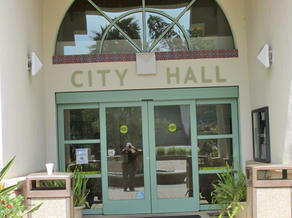Desal, reclaimed, and fresh water: What makes the most sense and costs the least cents?
The City of Avalon has the potential with the vast ocean resource and existing desal to create an abundant supply of fresh water. City officials also examined and had prepared a report on the use of reclaimed water (“Recycled Water/Energy Sustainability Plan Sub-Plan Study,” June 2016, MBI).
Desal, reclaimed, and fresh water: What makes the most sense and costs the least cents?
The City of Avalon has the potential with the vast ocean resource and existing desal to create an abundant supply of fresh water. City officials also examined and had prepared a report on the use of reclaimed water (“Recycled Water/Energy Sustainability Plan Sub-Plan Study,” June 2016, MBI).
The City Council allocated funds in the 2016-2017 budget for future development of reclaimed water. With the issue of desal and potable water taking the forefront over the last 10 months, further examination of the reclaimed water option by staff has not occurred. The focus of staff has been to encourage and support fresh water solutions and encourage and urge SCE to move forward with a desal strategy that makes Avalon drought free.
The City Council made fresh water supply to Avalon a top priority for city government, and they have been successful by their perseverance. We are continuing to work to ensure that the City and SCE are successful in gaining State Proposition 1 grant funds for desal plant improvements that are needed. We have offered as well to become advocates for proposed desal improvements with regulatory agencies that must permit them.
City staff is currently working with Southern California Edison to prepare the strongest application possible to secure Proposition 1 funding.
We have agreed to resume meeting with SCE on other state and Federal grants now that we know SCE’s fresh water plan (per the Greenly & Hansen Report dated April 2017). The city has supported SCE grant requests to the United States Bureau of Reclamation as previously reported.
Most of us would agree that current salt water system for fire suppression, toilets, and street washing has many limitations and detrimental impacts on our fire apparatus and salt water infrastructure.
We find breaks often in the salt water system, clogged mains and valves, and its harsh treatment on fire apparatus. We also are likely to agree that there is an abundant supply of salt water available that can never be duplicated as a standby for fire suppression services.
From a public policy standpoint, it occurs to many people that some questions need to be asked and information generated to determine the following:
1. What should be the role of desal water in the delivery of fresh water resources to the city? If there is an abundant supply of desal water available or that could be made available, why should the city operate a salt water system and/or spend funds on a reclaimed water system? What are the estimated costs to do same?
2. What steps can and should be taken to lower the cost of desal water production by using solar energy converted to electricity at the SCE plant?
3. What should be the role of reclaimed water in the delivery of water for city use? It is estimated that the cost in 2016 dollars is $11.6 million to build at the wastewater treatment plant, and reclaimed water would only produce 0.39 percent mgd of reclaimed water for urinalflushing and fire suppression. Why would the city want to invest in an expensive system that can only produce this amount of reclaimed water?
4. What is the role for the future of the city’s existing salt water system?
Is it still needed? Should it be eliminated, maintained in its current form, or become part of some other integrated water system?
5. Should the city be operating multiple and expensive water treatment systems concurrently, and if so, at what cost?
6. What is the impact on the cost to ratepayers of each alternative?
What approach is the most cost effective and burdens the taxpayer the least amount?
Members of the City Council have asked for an update on this important topic and we anticipate doing so in June.
David Jinkens is the city manager of Avalon.











